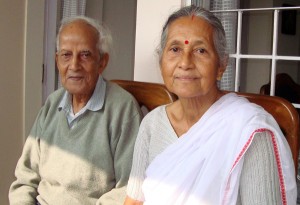 He has to be the happiest citizen in Guwahati. Nonagenarian Major (retired) Satyabrata Lahkar, born on November 25 1919, keeping away doctors for years and adroitly editing, publishing an Assamese monthly for half a century, is probably the senior-most editor in the world. Smiling old man Major Lahkar last visited a doctor for an eye surgery two years ago and now does not wear glasses. He can see clearly, he speaks fluently, and walks briskly. Sound health, physical and mental, is Major Lahkar’s wealth and neighbor’s envy.
He has to be the happiest citizen in Guwahati. Nonagenarian Major (retired) Satyabrata Lahkar, born on November 25 1919, keeping away doctors for years and adroitly editing, publishing an Assamese monthly for half a century, is probably the senior-most editor in the world. Smiling old man Major Lahkar last visited a doctor for an eye surgery two years ago and now does not wear glasses. He can see clearly, he speaks fluently, and walks briskly. Sound health, physical and mental, is Major Lahkar’s wealth and neighbor’s envy.
Major. Lahkar lives with his octogenarian wife at a fifth floor apartment in a Guwahati multi-storied building. His son, Assam Tribune journalist Mr. Bedabarta Lahkar occupies another flat there while his octogenarian brother, Col (Retd) Tirthabrata Bhuyan Lahkar lives nearby. All Major Lahkar’s three brothers- three, eight and nine years younger than him, are in excellent spirits.
What’s the secret of Major Lahkar musical health?
“I bother about nothing. Even if I happen to lose some money, I don’t waste my time discussing it. And I maintain a regular time for everything like food, meetings, and social visits.” This was the amiable answer from Major Lahkar. He wakes up six in the morning, spends half an hour for yogasana, scans newspapers and by eight o’ clock, he has his breakfast. All his life Major Lahkar has been surprisingly punctual in his personal and public life, though he never displays a military zeal for this.
No drinks, no cigarettes. Not even during Army days and then fellow men taunted. Major Lahkar remained untouched.
Major Lahkar joined the British Army in 1942 when he was commissioned as a Second Lieutenant at Indian Military Academy in Dehradoon. In 1947, just before India attained freedom, he quit Army as a Major. He came to Assam to be inducted as Commandant of Assam Police Battalion. In 1952, he went to Arunachal Pradesh, then known as NEFA (North East Frontier Agency) worked there till 1954 as Political Officer and magistrate. Major Lahkar is a strong pillar of Ex-servicemen’s Association in Assam.
At home or away, Assam’s people have duly acknowledged Major Lahkar’s social dedication and efforts to undo an evil. For example, Lahkar was in the British Army when he noticed misinformation about Assam being published in Hindustan Year Book, which he promptly corrected. He was conferred the titles of Assam Ratna in 1962 and Sangbad Siromini later. But apart from these awards and formal felicitations, Major Lahkar’s stupendous success in life in terms of a lasting contribution, is the unbroken publication of an Assamese monthly Nam Nai from 1956 till date. The literal translation of Nam Nai into English is “nameless”; and the journal published without a break is dedicated to farmers, workers, soldiers, housewives and voters who are nameless. The magazine is a hallmark of Major Lahkar’s audacity. He collects writers’ contributions, edits them and sends them to press, dispatches copies to subscribers and collects money from advertisers—no office set up to execute these works. And he has been ably doing it for half a century, now aided by his life partner Mrs. Amiya Lahkar. Nam Nai is an authentic script of Assam’s socio-political growth; the solemn pages of this austere magazine deserve to be preserved as a sacred news book about Assam.
By Dhruva Saikia, Guwahati
- Log in to post comments